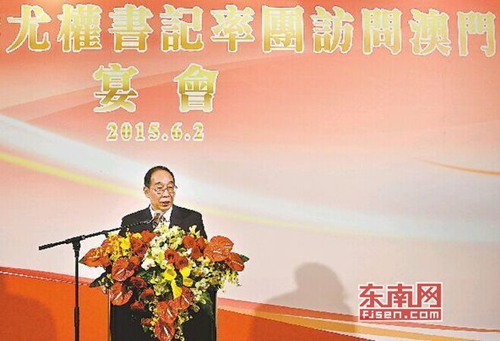Macao to help Fujian go global, say experts
( chinadaily.com.cn )
Updated: 2015-06-05
Macao will serve as the bridge between Fujian province and Portuguese-speaking countries, according to experts.
Fujian's Party Secretary You Quan led a delegation to Macao to promote cooperation on June 2 and 3, a testament to the increasingly close ties between the two.
 |
|
You Quan, Party Secretary of Fujian province, delivers a speech at a welcoming party on June 2. Enterprises from Fujian and Macao signed three agreements on joint ventures following Fujian Party Secretary You Quan’s visit to Macao on June 2, China News Service reports.[Photo/fjsen.com] |
Fernando Chui, Chief Executive of Macao, has already visited Fujian twice this year – in April and May – to discuss collaboration in the Chinese Road and Belt Initiative and tourism.
One of the biggest benefits for Fujian is that Macao can be a platform to increase economic and trade exchanges with Portuguese-speaking countries and Europe, observers said.
Nine countries use Portuguese as the official language, on four continents, with a total population of 250 million. They have high demand for electronic and manufactured products.
Macao has deep historical connections with Portuguese-speaking countries, and has a complete infrastructure, finance system, business environment and a lot of bilingual professionals, which make it an important platform for communications, said a researcher with the Fujian Commerce Department.
Fujian and Macao are geographically and culturally close, too. One fifth of Macao’s residents are ancestrally from Fujian.
Figures show that from January to July in 2014, trade between Fujian and Portuguese-speaking countries reached $2.6 billion, a 0.84 percent growth year on year. As of July, 2014, there are 21 enterprises funded by Portuguese-speaking countries in Fujian. And Fujian has set up a dozen companies or institutions in Portuguese-speaking countries, with investment up to $220 million.
Since 2005, Fujian and Macao’s business promotion department have annually arranged Fujian enterprises to attend business fairs and explore markets in Portuguese-speaking countries. Fujian also sent a delegation to the Macau International Trade and Investment Fair, where special sessions between Fujian and Portuguese-speaking countries’ enterprises are held regularly.
More cooperation between Fujian and Portuguese-speaking countries in agriculture, fishery, engineering, infrastructure construction, resource exploitation and human resources development can be expected, said expert.
Currently, the economic and trades exchange between Fujian and Portuguese-speaking countries are still at a low level, and Macao expects to play a bigger role as a facilitator.
There are growing demands in Portuguese-speaking countries for textiles, daily goods, household appliances and machinery, while Fujian relies heavily on Brazil’s iron ore, lumber, paper pulp, coffee, soybeans and meat, and Angola’s oil, gas and minerals.
A member of the Fujian-Macao Cooperation Promotion Committee suggested that Fujian and Macao can hold exhibitions of Fujian’s products in Portuguese-speaking countries. Enterprises are also encouraged to set up distributions centers there.






